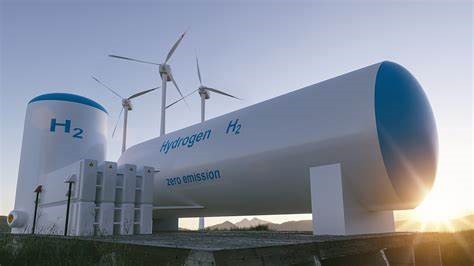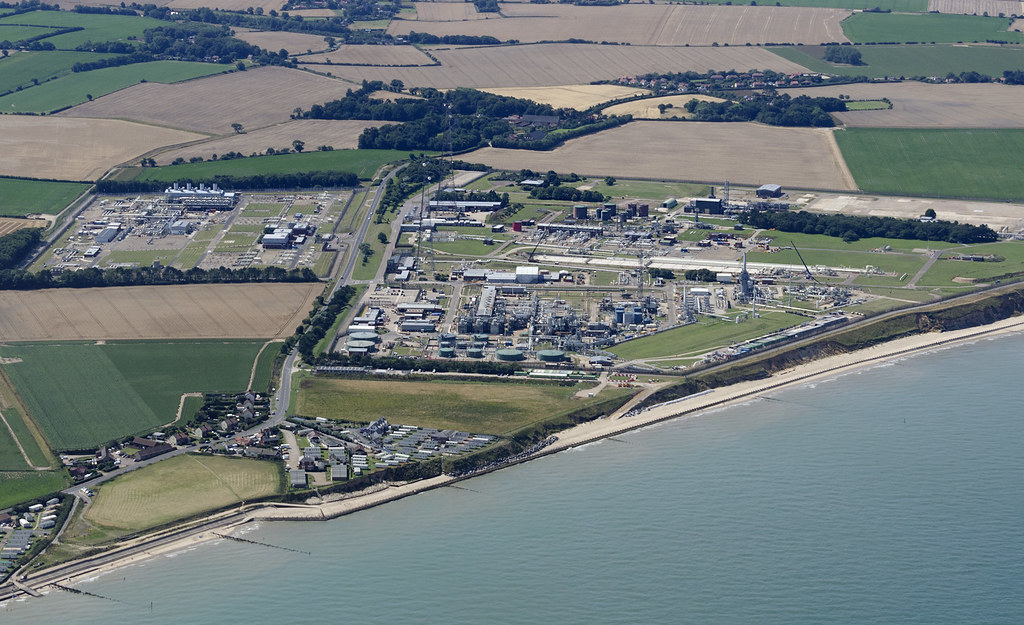Pipeline or Hub? Harnessing critical energy infrastructure on the North Norfolk Coast

Pipeline or Hub? Harnessing critical energy infrastructure on the North Norfolk Coast

Primary Investigator – Dr Stuart Dawley, Newcastle University
Co-Investigators – Prof Will Eadson – Sheffield Hallam University, Dr Phil Northall – Sheffield Hallam University, Dr Gareth Powells – Newcastle University, Dr Markus Steen – SINTEF Digital
Project overview
Since its construction in the 1960s, the Bacton terminal has become a critical energy infrastructure asset for the UK. Bacton provides 20% of national gas supplies, harnesses a range of South North Sea gas fields, serves two dual flow gas European interconnectors and provides operations for global energy giants Shell and Perenco. Despite being at the heart of carbon intensive energy supplies for over 60 years, the UK’s Net Zero 2050 targets offer an opportunity to convert Bacton into a regional and national low-carbon infrastructural asset. Utilizing both blue and green hydrogen and carbon capture and storage (CCS) technologies, Bacton has the potential to become a leading infrastructure hub that “plays a major role in the UK’s energy future” (North Sea Transition Authority 2021 p.1).

The point of departure for this research proposal, and its overall objective, is to examine the opportunities and challenges for North Norfolk in harnessing and valorising Bacton as an infrastructural asset within the UK’s broader energy transition. Whilst the bourgeoning offshore wind sector off the coast of East Anglia has brought relatively limited economic and community development to North Norfolk, can the geographically rooted and material nature of the Bacton gas terminal infrastructure stimulate a new and qualitatively different path of development? Existing work on Bacton’s trajectory provides an optimistic outlook, but this work tends to focus on engineering dimensions alongside quantitative projections and forecasts (NTA 2021; Hydrogen East 2022). In response, our proposed research seeks to better understand North Norfolk’s ‘place’ within the emerging visions and discourses of Bacton’s role in the energy transition. In other words, this pilot project seeks to assess the extent to which the energy transition can make Bacton a development for rather than simply in North Norfolk.
Conceptually, we will draw insights from three state-of-the-art perspectives on energy transition and place. First, we look to spatial perspectives within the socio-technical sustainability transitions field, including the crucial role played by key transition spaces, the operation of multi-scalar processes, and the spatial politics of transition (Coenen et al 2022). Given our focus on bringing benefits to North Norfolk, we will adopt a ’just transitions’ dimension to understand how decarbonisation processes can foster equitable and fairer distributions of burdens and benefits for people and places (Williams and Doyon 2019). Second, we look to the recent scholarship on the place-based nature of infrastructure-led development, for instance through governance arrangements, economic performance or how infrastructure reveals the way regions and places are experienced differently by different social and economic groups (Glass et al 2019). Third, we bring these two perspectives into conversation with the flourishing field of evolutionary economic geography (EEG), understanding how localities and regions are enabled or constrained in harnessing historical and placed based assets for new ‘path creation’ in industrial activities, sectors and markets (Mackinnon et al 2019). Despite increased attention to energy and low carbon paths within the EEG literature, we still know relatively little about how agents, assets and conditions come together in the development of low carbon energy growth paths, nor the qualitative nature of activities created (e.g. skills, investment etc), especially in peripheral and non-industrial regions (Li et al 2016). In drawing together these three sets of approaches, we provide the tools to investigate mechanisms and processes of development as well as their potential outcomes for people and places. Alongside these conceptual developments, the Bacton case study also offers empirical novelty. Most attention in both academic and policy perspectives has focused on ‘brownfield’ industrial localities and clusters as locational drivers for hydrogen and CCS (Sovacool et al 2022), North Norfolk is distinctive with its gas infrastructure embedded in a rural and coastal greenfield context.
Analytically, we also aim to go beyond existing policy reports that look at Bacton’s potential in isolation, by understanding its trajectory within broader sets of inter-relations and institutional contexts. Our research design and team has been developed to provide both national (e.g. Humber; Teesside; Aberdeen; Wirral) and international (e.g. Norway; Sweden; Netherlands) comparative analysis of coastal regions and localities developing and competing for growth paths in hydrogen and CCS. We bring significant experience of understanding how investment decisions in localities are mediated within broader structures of governance and policy (e.g. BEIS Cluster Sequencing 2022), corporate networks (e.g. Shell) and international political economies of energy markets and networks (Bridge and Gailing 2020). Taken together we hope to develop a series of best practice policy related insights into what works for localities and regions developing growth paths around hydrogen and CCS.
Work Packages
Addressing the overall aim of examining the opportunities and challenges for North Norfolk in harnessing and valorising Bacton as infrastructural asset, the research is designed around 4 inter-related work packages:
1). ‘Placing’ hydrogen and CCS economies: We will review academic, policy and industry literatures to better understand and frame the development of local and regional strategies and visions around hydrogen and CCS. We aim to develop a range of comparator case studies around which we can better understand the enabling and constraining conditions for Bacton and North Norfolk. This will include a review and analysis of UK energy and industry policy relevant to hydrogen and CCS.
2). Understanding the evolution of Bacton and South North Sea gas landscape: Within our evolutionary perspective, we will chart the development of gas energy infrastructures at Bacton and the South North Sea to understand both its drivers and impacts (economic, social and landscape). Using secondary data (archives; policy and corporate reports etc) and fieldwork interviews with key stakeholders, we will provide i) an overview of the trajectory upon which the potential hydrogen and CCS path will connect ii) a basis around which to compare and contrast future development impacts.
3). Exploring the potential trajectory of Bacton as an Energy Hub in H2 and CCS and its implications for the development of North Norfolk: This work packages focuses on i) unpacking and analysing the enabling and constraining conditions, actors and policy contexts that will mediate the scale and scope of Bacton’s development. ii) exploring the opportunities and challenges for North Norfolk around 5 inter-related themes: economic development; jobs, employment and training; landscape resilience; local, regional and national governance; sustainable living. The majority of this work will be field-based interviews with key stakeholders from across the private, public and community sectors in North Norfolk and East Anglia.
4) Synthesis and Outputs: Based on a synthesis of findings from WPs1-3, this task will develop three inter-related outputs: i). policy relevant recommendations for local and regional stakeholders on how to make the most out of potential pipeline developments ii) an academic paper targeted at an interdisciplinary journal, developing new empirical and conceptual insights on clean energy and decarbonisation infrastructure away from large industrial clusters (e.g. Energy Policy; Environment and Planning A). iii). The outline for a larger research proposal (with potential international collaboration) to undertake comparative analysis of coastal regions, infrastructure adaptation and emerging H2 and CCS trajectories.
Our proposal has the support and involvement of North Norfolk District Council (NNDC) (see letter of support). We are pending confirmation from East of England Energy Group (EEEGR) and Hydrogen East in joining NNDC as non-academic advisory panel. As part of WP4 we will undertake a project meeting in North Norfolk which, with guidance from the panel, can also be adapted into an external dissemination event if requested.
Project team
The team brings together international research expertise around energy transitions; energy infrastructures; local and regional development and governance. All researchers are engaged in work exploring emerging hydrogen economies and the potential of CCS.
Dr Stuart Dawley is Reader in Economic Geography in the Centre for Urban and Regional Development Studies (CURDS) at Newcastle University. His recent research has focused on the role of low carbon and renewable energies in the regeneration of peripheral regions. He has published widely on the growth of the offshore wind sector and its impact on the economic development trajectories of regions in the UK and Europe (e.g. Economic Geography; Progress in Planning; Regional Studies). Between 2018 and 2022 he served as Head of Geography at Newcastle University. *iPACT Sandpit Attendee: Norfolk 2023*
Will Eadson is Professor of Urban and Regional Studies at the Centre for Regional Economic and Social Research (CRESR), Sheffield Hallam University, where he leads a programme of research on low carbon economy and enterprise. Recent work in this field includes studies of: regional hydrogen and related CCUS developments across Northern Europe and social and cultural implications of industrial decarbonisation. Will’s research has been funded by a wide range of bodies, including ESRC, EPSRC, Research England and international research councils and has conducted research for UK and Swedish government, regional development agencies, City Regions and local authorities as well as national charitable organisations. Recent articles have been published in Energy Policy, Global Environmental Change and Public Administration Review.
Dr Phil Northall is a Research Associate in the Centre for Regional Economic & Social Research (CRESR) at Sheffield Hallam University. He is a qualitative researcher investigating just transitions to low carbon economies, focussing on the skills, supply chains, public participation, and partnership aspects of industrial decarbonisation. This includes a study of regional hydrogen economies across Europe, looking at five case study clusters in the UK, Netherlands, and Sweden. Other work explores the role of SMEs in decarbonisation, and as part of a just transition, funded by the UK Energy Research Centre and Research England respectively, with the latter delivered through the newly established South Yorkshire Sustainability Centre. Previously, Phil was involved in an analysis of six low carbon supply chains, including hydrogen and CCUS, for the South Yorkshire Mayoral Combined Authority, and a study of the societal and cultural challenges of industrial decarbonisation for the Humber Industrial Cluster Plan.
Gareth Powells, Senior Lecturer in Geography at Newcastle University, was central to a major national research centre as Co-I in the Centre for Energy System Integration (CESI) and is advancing debates on the fairness of the new forms of energy supply and demand associated with the decarbonisation, digitisation and decentralisation of energy systems. Powells has been Co-I or PI on research grants totalling £3.49m with funders including EPSRC, ESRC, as well as private sector collaborators (e.g., Northern Gas Networks, Northern Powergrid, Cadent Networks, Affordable Warmth Solutions Ltd) and charities (e.g., National Energy Action). He has recently published in the International Journal of Hydrogen Energy; Energies; Energy Research & Social Science.
Markus Steen works as Senior Research Scientist in SINTEF Digital, Department of Technology Management, research group Innovation and Sustainability. He is part of the management team in the two Norwegian research centres FME NTRANS (Norwegian energy transition strategies) and INTRANSIT (Innovation Policy for Industrial Transformation, Sustainability and Digitalization), and leads the Norwegian Gemini Centre Sustainability Transitions. He is PI on the large-scale CCUS project funded by the Norwegian Research Council, connecting Norway, UK, Sweden and Netherlands (CaptureX 2021-2024).